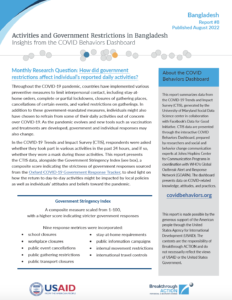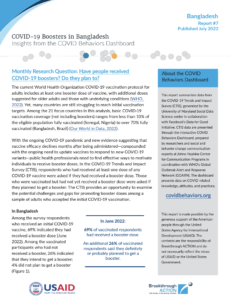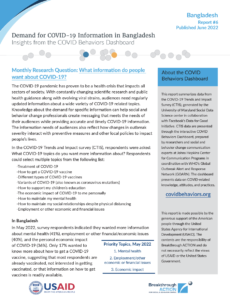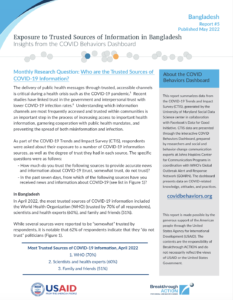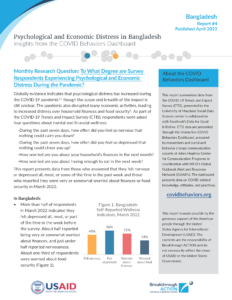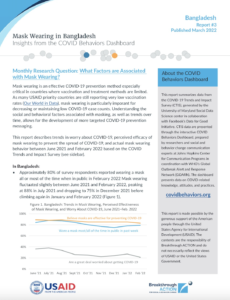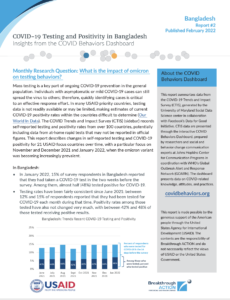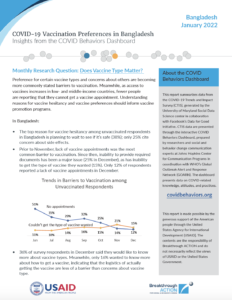Breakthrough ACTION produces monthly reports for 21 United States Agency for International Development (USAID) priority countries based on the COVID-19 Trends and Impact Survey (CTIS), launched by Facebook in partnership with the Delphi Group at Carnegie Mellon University in the United States and the University of Maryland Social Data Science Center globally. These reports focus on a different research topic each month and aid users hoping to learn more about COVID-19 perceptions and behaviors in these high-priority countries. For more information and visuals from the CTIS, visit covidbehaviors.org.
August 2022: How did government restrictions affect individual’s reported daily activities?
Throughout the COVID-19 pandemic, countries have implemented various preventive measures to limit interpersonal contact, including stay-at-home orders, complete or partial lockdowns, closures of gathering places, cancellations of certain events, and varied restrictions on gatherings. In the COVID-19 Tre n ds and Impact Survey (CTIS), respondents were asked whether they took part in various activities in the past 24 hours, and if so, whether they wore a mask during those activities. This report presents the CTIS data, alongside the Government Stringency Index (see box), a composite score indicating the strictness of government responses sourced from the Oxford COVID-19 Government Response Tracker, to shed light on how the return to day-to-day activities might be impacted by local policies as well as individuals’ attitudes and beliefs toward the pandemic.
Bangladesh | Bolivia | Brazil | Côte d’Ivoire | Egypt | Ethiopia | Ghana | Guatemala | Honduras | India | Indonesia | Kenya | Mozambique | Myanmar | Nepal | Nigeria | Pakistan | Philippines | South Africa | Ukraine | Vietnam
July 2022: Have people received COVID-19 boosters? Do they plan to?
The current World Health Organization COVID-19 vaccination protocol for adults includes at least one booster dose of vaccine, with additional doses suggested for older adults and those with underlying conditions (WHO, 2022). Yet, many countries are still struggling to reach initial vaccination targets. In the COVID-19 Trends and Impact Survey (CTIS), respondents who had received at least one dose of any COVID-19 vaccine were asked if they had received a booster dose. Those who were vaccinated but had not yet received a booster dose were asked if they planned to get a booster. This analysis of 21 countries provides an opportunity to examine the potential challenges and gaps for promoting booster doses among a sample of adults who accepted the initial COVID-19 vaccination.
Bangladesh | Bolivia | Brazil | Côte d’Ivoire | Egypt | Ethiopia | Ghana | Guatemala | Honduras | India | Indonesia | Kenya | Mozambique | Myanmar | Nepal | Nigeria | Pakistan | Philippines | South Africa | Ukraine | Vietnam
June 2022: What information do people want about COVID-19?
The COVID-19 pandemic has proven to be a health crisis that impacts all sectors of society. With constantly changing scientific research and public health guidance along with evolving viral strains, audiences need regularly updated information about a wide variety of COVID-19-related topics. Knowledge about the demand for specific information can help social and behavior change professionals create messaging that meets the needs of their audiences while providing accurate and timely COVID-19 information. The information needs of audiences also reflect how changes in outbreak severity interact with preventive measures and other local policies to impact people’s lives. This report presents data on top requested COVID-19 and related topics from the respondents of 21 countries to the COVID-19 Trends and Impacts Survey (CTIS).
Bangladesh | Bolivia | Brazil | Côte d’Ivoire | Egypt | Ethiopia | Ghana | Guatemala | Honduras | India | Indonesia | Kenya | Mozambique | Myanmar | Nepal | Nigeria | Pakistan | Philippines | South Africa | Ukraine | Vietnam
May 2022: Who are the trusted sources of COVID-19 information?
The delivery of public health messages through trusted, accessible channels is critical during a health crisis such as the COVID-19 pandemic. Recent studies have linked trust in the government and interpersonal trust with lower COVID-19 infection rates. Understanding which information channels are most frequently accessed and trusted within communities is an important step in the process of increasing access to important health information, garnering cooperation with public health mandates, and preventing the spread of both misinformation and infection. This report presents data on trust and exposure to information sources from the respondents of 21 countries to the COVID-19 Trends and Impacts Survey (CTIS).
Bangladesh | Bolivia | Brazil | Côte d’Ivoire | Egypt | Ethiopia | Ghana | Guatemala | Honduras | India | Indonesia | Kenya | Mozambique | Myanmar | Nepal | Nigeria | Pakistan | Philippines | South Africa | Ukraine | Vietnam
April 2022: To what degree are survey respondents experiencing psychological and economic distress during the pandemic?
Globally evidence indicates that psychological distress has increased during the COVID-19 pandemic, though the scope and breadth of the impact are still unclear. The pandemic also disrupted many economic activities, leading to increased distress over household finances and food security. This report presents data from the respondents of 21 USAID priority countries to the COVID-19 Trends and Impacts Survey (CTIS). Respondents who reported feelings of nervousness or depression and those who reported worries about finances or food security in March 2022 were included.
Bangladesh | Bolivia | Brazil| Burkina Faso | Côte d’Ivoire | Democratic Republic of Congo | Egypt | Ethiopia | Ghana | Guatemala | Guinea | India | Indonesia | Kenya | Mali | Mozambique | Nepal | Nigeria | Philippines | Senegal | South Africa
March 2022: What factors are associated with mask-wearing?
Mask-wearing is an effective COVID-19 prevention method especially critical in countries where vaccination and treatment methods are limited. As many USAID priority countries are still reporting very low vaccination rates, mask-wearing is particularly important for decreasing or maintaining low COVID-19 case counts. Understanding the social and behavioral factors associated with using masks, as well as trends over time, allows for the development of more targeted COVID-19 prevention messaging. This report describes trends in worry about COVID-19, the perceived efficacy of mask-wearing to prevent the spread of COVID-19, and actual mask-wearing behavior between June 2021 and February 2022.
Bangladesh | Bolivia | Brazil| Burkina Faso | Côte d’Ivoire | Democratic Republic of Congo | Egypt | Ethiopia | Ghana | Guatemala | Guinea | India | Indonesia | Kenya | Mali | Mozambique | Nepal | Nigeria | Philippines | Senegal | South Africa
February 2022: What is the impact of omicron on testing behaviors?
Large-scale testing is a key part of ongoing COVID-19 prevention in the general population. Individuals with asymptomatic or mild COVID-19 cases can still spread the virus to others; therefore, quickly identifying cases is critical to an effective response effort. This report describes changes in self-reported testing and COVID-19 positivity for 21 USAID focus countries over time, with a particular focus on November and December 2021 and January 2022, when the omicron variant was becoming increasingly prevalent.
Bangladesh | Bolivia | Brazil| Burkina Faso | Côte d’Ivoire | Democratic Republic of Congo | Egypt | Ethiopia | Ghana | Guatemala | Guinea | India | Indonesia | Kenya | Mali | Mozambique | Nepal | Nigeria | Philippines | Senegal | South Africa
January 2022: Does vaccine type matter?
Preference for certain vaccine types and concerns about others are becoming more commonly stated barriers to vaccination. Meanwhile, as access to vaccines increases in low- and middle-income countries, fewer people are reporting that they cannot get a vaccine appointment. Understanding reasons for vaccine hesitancy and vaccine preferences should inform vaccine promotion programs.
Bangladesh | Bolivia | Brazil| Burkina Faso | Côte d’Ivoire | Democratic Republic of Congo | Egypt | Ethiopia | Ghana | Guatemala | Guinea | India | Indonesia | Kenya | Mali | Mozambique | Nepal | Nigeria | Philippines | Senegal | South Africa

